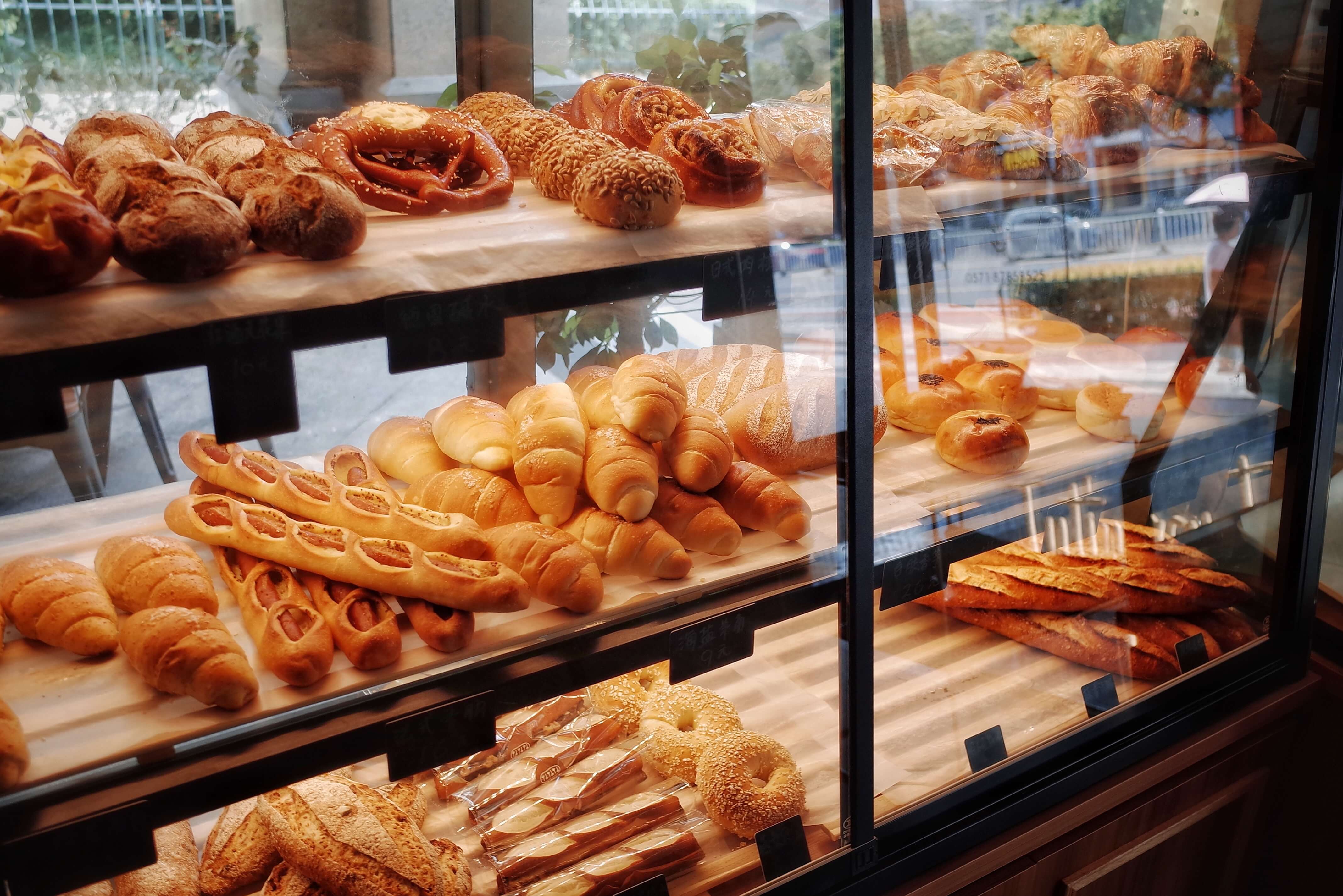Baking is an ancient craft. Historians have found evidence that the Romans, Egyptians and even hunter gatherers from the pre-Neolithic period, some 14,000 years ago, baked goods [1]. Technologies and tastes may have moved on since then, but the essence of creating baked flour-based products in an oven remains remarkably untouched thousands of years later.
History of baking
The Industrial Revolution in the 18th century brought significant changes to the baking industry. With the invention of steam-powered mills, flour production became more efficient, leading to the production of finer and cheaper flour. This, in turn, led to the mass production of bread in factories, replacing traditional handcrafted methods.
In the 20th century, innovations such as pre-packaged cake mixes, commercial yeast, and frozen dough further revolutionised the baking industry, making baking more convenient and accessible to people around the world. Baking also became a form of art, with professional bakers creating intricate and decorative cakes, pastries, and bread sculptures.
Today, baking continues to be an important part of many cultures, with a wide variety of bread, pastries, cakes, and other baked goods enjoyed by people all over the world. Baking has a rich and diverse history that has evolved over time, influenced by technological advancements, cultural traditions, and changing tastes and preferences.
Of course, the popularity of shows like the Great British Bake-Off has helped to inspire new generations of bakers and if you want to join them by opening your own bakery, we have created this practical guide to help your business rise, covering:
- Opening a bakery
- Creating a baking business plan
- Do you need qualifications to open a bakery?
- How to take payments at your bakery
- The cost of opening a cake business
So if you’re opening a bakery, we’ve got all the information here that you need to make it a success.
How to open a bakery UK
In this section, we’ll go through each of the most important steps you need to take to learn how to open a bakery in the UK. Of course, the first thing you need is an idea and the passion and the talent to make it successful, but you’ll need much more than that to get up and running.
Location, location, location
One of the first things you need to decide upon is location. This requires research to find premises that are available and affordable, but also checking out what competition there already is in the neighbourhood to see whether there is the demand to sustain another bakery.
Product fit
Choosing the right product for your business is crucial for its success. For example, if you plan to open a vegan cupcake shop in an area already saturated with similar businesses, you may face intense competition, making your job harder. Similarly, if you're considering a café bakery that offers pastries and coffee in a commuter district, but there are already numerous similar options available without offering anything new, it may not thrive.
Therefore, thorough research is essential to identify the local demand and choose a product that meets the needs of the market, ensuring better chances of success for your business.
This is the first step towards creating a business plan for your bakery.
Creating a bakery business plan
Creating a comprehensive business plan is an essential step in organising and strategising for a bakery, and it should include the following:
- Market Analysis - Thoroughly understanding the market landscape, including competition and industry trends is crucial. Research your competitors and identify opportunities for your unique selling proposition (USP) to stand out. You should also gather insights into your target customers and their needs to develop strategies to meet those needs effectively. For example, look at the demographics of the area to see whether this gives any indication to what kind of baked goods are likely to be popular.
- Business Overview - Clearly outline your bakery’s point of view and include an executive summary. Demonstrate deep knowledge of your product, management, and sales structures. A well-structured and efficiently managed business is more likely to attract customers as well as impress potential investors.
SWOT Analysis: Perform a SWOT analysis, evaluating the strengths (S), weaknesses (W), opportunities (O), and threats (T) of your business. This helps you anticipate potential challenges and mistakes and aids in visualising the future of your business. - Legal and Health & Safety Obligations - Understand and comply with legal requirements, including obtaining permits, registering your business, and obtaining necessary licences. Familiarise yourself with business guidelines and food handling laws, which are essential for how to open a bakery in the UK.
A well-crafted business plan serves as a roadmap for your business, providing a strategic direction and helping you make informed decisions. It is a vital tool for planning, organising, and executing your business goals and ensuring the long-term success of your bakery venture.
Types of bakery business
When planning your bakery business, it's also hugely important to consider the type of business model you want to pursue. Here are some options to consider:
- Home Bakery - Many bakers start their business by operating from their own home kitchen to minimise costs. This option is ideal for those on a smaller budget and can be a good starting point, but be sure to research local regulations and guidelines for operating a catering business from home. It’s also a good side hustle as many people work a full-time job but also run a bakery stall at the weekend.
- Coffee shop bakery - This model includes a production kitchen for baking goods, as well as a front-of-house counter and seating area for customers to enjoy their treats with hot beverages. While serving beverages can supplement income, it requires a larger upfront investment and additional costs for front-of-house staff.
- Retail bakery - In a retail bakery, you'll have a production kitchen and a counter for customers to purchase takeaway goods. Food is not consumed on the premises, keeping venue costs lower. This model may also offer made-to-order products and serve as a pick-up point for customers.
Wholesale bakery: A wholesale bakery supplies baked goods to local businesses, restaurants, and cafes, and may also sell at markets. There is no customer-facing unit, which helps to keep costs down, but mass production capabilities and building relationships with local businesses are important considerations.
As part of your business plan, identifying the type of bakery business model you want to pursue will help you make informed decisions and set a clear direction for your bakery venture.
Do you need qualifications to open a bakery in the UK?
One of the advantages of pursuing a career as a baker is that formal qualifications are not necessarily required. While the National Careers Service suggests achieving GCSEs at grades 9 to 4 in subjects like English, maths, science, and food technology, all you really need are basic skills and determination to hone your craft.
If you aspire to start a baking business, possessing fundamental measuring and mathematical skills, practical expertise, and organisational abilities will prove invaluable. The ability to multitask and meet deadlines is also essential, as baking is often regarded as a precise science. However, even if you are not an expert baker, you can still establish a baking business and hire staff with specialised skills.
For those who are committed to becoming an artisan baker, there are various optional training courses and programs available. One esteemed option is the National Bakery School, affiliated with London South Bank University, which offers comprehensive three-year undergraduate courses covering baking science, technology, management, and food safety, providing a solid foundation for starting a baking business.
Many local colleges also offer part-time or evening courses specifically focused on acquiring baking skills and a business degree could be beneficial for starting a new business. However, these courses are not mandatory. While they can speed up the development of necessary skills, there is no legal obligation to obtain a degree to start up your own bakery.
There is also no legal requirement to get a food standard safety certification but it is recommended by the Food Standards Agency (FSA).
Other useful resources on making sure your food business is in line with FSA hygiene guidelines include:
- Getting ready to start your food business
- Starting a food business from your home
- Setting up your food business premises
How to take payments at your bakery
Another factor to consider about opening a bakery in the UK is that you will need a way to take payments. Being prepared to accept various forms of payment right from the start is crucial when starting a successful bakery. Ensuring smooth integration between online orders, in-store purchases, and catering invoices is essential.
Dojo Go is a next-gen card machine that packs a punch. Designed to move with your business, it’s as light as an iPad, features mobile connectivity and has a 10-hour battery life. Not to mention the ability to take lightning-fast payments.
Cost of opening a bakery UK
So what is the cost of opening a bakery in the UK? The cost of building up a baking business can vary depending on the scale of your plans, (clearly doing it from home will be cheaper) but in general, you should budget for the following expenses:
- Licensing and Legalities - Estimated cost: £500-£1000 - Before you can start serving food to the public, you'll need to obtain various licences. Depending on the previous use of your venue, you may also need to apply for a change of use class. It's important to understand the legal requirements for opening a bakery and you can find more information in our guide to the rules and regulations section.
- Location - Estimated cost £1000-£5000 per month for rent or mortgage, depending on size and location - Your venue is likely to be the most significant expense when opening a bakery. The exact cost will depend on the size and location of your chosen premises. Additionally, there may be costs for conveyancing or solicitor fees for the leasing process, which typically range from £400-£1500, depending on the length and scale of the work.
- Renovation and Storefront - Estimated cost: £200 minimum - Unless you're purchasing or leasing a former bakery, you may need to make renovations to your chosen space. The cost will depend on the amount of work needed, so it's important to obtain quotes from tradespeople for a more accurate figure. At the very minimum, you'll need to budget for signage for the exterior, which can cost a couple of hundred pounds.
- Equipment - Estimated cost: £3000-£6000 - The kitchen is the heart of your bakery, so it's essential to invest in quality equipment. The exact cost will depend on the scale of your business and the types of food products you plan to make. Basic bakery equipment, such as a fridge, oven, mixer, and industrial baking equipment, can be set up for around £3000. However, if you plan to make speciality items that require specialised equipment, such as doughnuts, the cost may be higher. If you're opening a coffee shop bakery, you'll also need to budget for an espresso machine, which can cost between £1000-£2000, depending on the model and size. Tables and chairs for seating will also be necessary.
- Raw Ingredients - Estimated cost: £500-£2000 - Setting aside a portion of your budget for raw ingredients is important, especially during the first few weeks of operation. Having an initial stock of ingredients will save you time when you're busy with customers.
- Marketing and Media - Estimated cost: £300-£700 - It's crucial to allocate a budget for marketing and media to establish an online presence and promote your bakery. This may include designing a website, printing business cards and advertising. You can increase your spending on marketing as your business grows.
Of course, these figures are rough estimates and actual costs may vary depending on the location and type of baking business you are planning to start. Once your business is up and running, you will also need to budget for ongoing expenses such as utilities, internet, regular ingredients and marketing, as well as wages, training, benefits, etc for any staff you employ.
Additionally, if you are self-employed, you will need to inform HMRC about your business for tax purposes. You can choose to register as a sole trader if you plan to run your business from home as a part-time operation, which means that legally, you and your business are considered one entity.
Alternatively, if you want to protect your personal assets and finances, you may consider registering your business as a limited company. Registering a company will give your bakery its own legal status as a separate entity.
As the owner, you will have "limited liability," which means you will only be held liable for company debts up to the value of your shares in the company. This can help safeguard your personal finances in case your baking business encounters financial difficulties.
Sources
[1] https://www.earth.com/news/humans-start-baking-bread/


